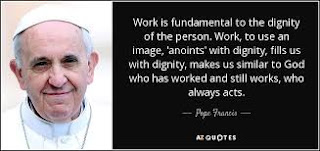In his Rule, St. Benedict refers to prayer as “the work of
God.” This term is unfamiliar to me, but it makes sense in many ways. Because both
work and prayer are repetitive, they are sometimes soothing and sometimes
tedious. At times work and prayer engage and stimulate the mind, and at other times
the repetitiveness frees the mind to rest and be open to new insights. Perhaps
most importantly, both work and prayer help us claim our dignity.
Pope Francis said, “Work is fundamental to the dignity of
the person. Work, to use an image, ‘anoints’ with dignity, fills us with
dignity, makes us similar to God who has worked and still works, who always
acts.” That work makes us similar to God is an awesome thought. Perhaps even
more awesome is that in praying we claim a relationship with God. The psalmist
asks, “What is man that you should be mindful of him, or the son of man that
you should care for him?” And yet, when we pray, God listens and enters into
dialogue with us. What can confer more dignity than having the Almighty acknowledge
our worth by being present to us?
Being anointed with dignity through work and prayer helps us
be open to the promptings of the Spirit and act with courage to be agents of
God’s justice and mercy. In the book of Daniel, we hear that Susanna, who was convicted
of a crime she did not commit, cried aloud to God, with whom she clearly had a
relationship. In response, “God stirred up the holy spirit of a young boy named
Daniel,” who responded by speaking out on behalf of Susanna and proving her
innocence. Prayer requires tenacity and devotion, but through the dignity it
provides, we are given the power to participate in the marvelous works of God.

No comments:
Post a Comment